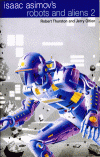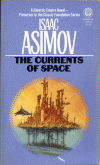This review will most likely contain spoilers for any previous books in the series, read at your own risk.
Fairly early in Intruder we saw that there was a third Silverside that had taken over Robot City. After an intense search Derec finally reclaimed control with the help of his friends. Now, Derec is faced with three robots without solid definitions of “human”. I think that this novel is quite a bit more philosophical in the search for what makes someone human. Not too much happens plot-wise, most of the bulk is focused on defining what is human. We do get a slightly better glimpse at the origins of the Silversides and a hint at where the series might end up toward the end.


